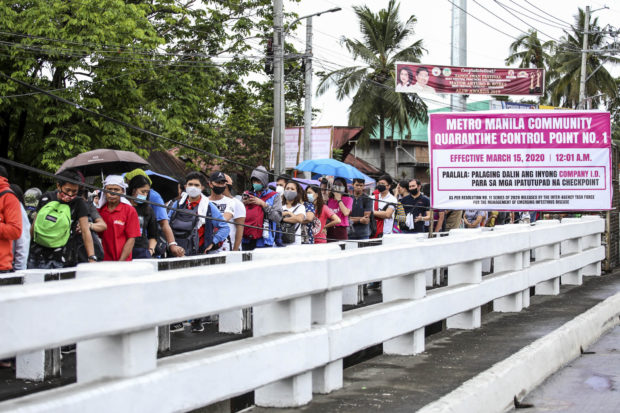
WAITING GAME Workers from Bulacan province form a queue as they wait for their turn to be screened by soldiers manning a checkpoint before they are allowed to enter Metro Manila through the boundary of Caloocan City and San Jose del Monte City as the capital region was put under community quarantine. —JAM STA. ROSA
Local governments on Tuesday scrambled to draw up guidelines as people’s anxiety in the provinces grew amid the new coronavirus disease (COVID-19) outbreak.
Among the top concerns were mobility, especially for the majority of those who do not have their own vehicles, and sustaining food and medical supplies during the monthlong quarantine.
President Rodrigo Duterte on Monday placed Luzon under an enhanced community quarantine to check the spread of the coronavirus. Mass transportation, including jeepneys and tricycles, was suspended to force people to stay home and reduce the risks of infection.
In some areas in Calabarzon (Cavite, Laguna, Batangas, Rizal and Quezon), however, privately owned cars were still allowed to drive past through checkpoints after passengers submitted themselves to thermal screenings.
“How about us who do not have a car? How do we go to the city center?” said Perlita Alvarez, a resident of Batangas City.
Hundreds stranded
In Cavite, Gov. Juanito Victor Remulla deployed 10 buses to bring home to the province about 400 residents stranded at the Parañaque Integrated Transport Exchange (PITX) following the suspension of public transportation.
Remulla said he would allow point-to-point buses to keep on operating from Cavite to PITX for employees who needed to report for work.
“We’re still working on the transport scheme. There were no clear directives from the national government. They passed on everything to LGUs (local government units),” a local official said.
In Laguna, San Pedro City Mayor Lourdes Cataquiz ordered every barangay to dispatch a vehicle to ferry residents who would need to buy food and medicines, or go to hospitals.“If the barangay did not have its own vehicle, it should hire a tricycle,” said City Administrator Filemon Sibulo.
In Biñan City, the local government would deploy 40 e-tricycles for in-city transportation.In Sta. Rosa City, Mayor Arlene Arcillas said most of the companies in industrial zones had agreed to provide shuttle services for employees.
Some business process outsourcing companies in Cavite and Laguna also provided shuttles, arranged carpooling, or offered employees a daily stipend or fuel.
“It’s a case-by-case basis [for manufacturing companies]. For example, a [noodle] factory here can’t afford to stop production because we might have to feed Luzon [later]. But it can do shifting [of employees],” Arcillas said.
She said other companies would house their workers inside the factories during the quarantine period.
In Batangas province, government-owned vehicles were allocated only for “essential business” like transporting medical supplies.
North Luzon
In Baguio City, Ferlyn Petras, who is in her late 20s, had to walk for about 5 kilometers while carrying her 7-day-old daughter to see a pediatrician at Baguio General Hospital and Medical Center for her baby’s regular checkup.
Her husband, Luisito, accompanied them.
The city government also readied a shuttle vehicle to ferry commuters who had to return to nearby provinces.
In La Trinidad, the capital town of Benguet province, strawberry farmers resorted to online selling as tourism-related activities were suspended.
In Pampanga province, hundreds of commuters were stranded along sections of Jose Abad Santos Avenue in the capital city of San Fernando on Tuesday after jeepneys did not ply their routes, police said.
Defiant drivers
Some tricycles in villages defied the transport ban to earn even a little amount. Homeowners’ associations in residential subdivisions, like Pilar Village in San Fernando, have denied entry to visitors of residents.
In Olongapo City, some jeepneys plied the national roads, but commuters were stuck in traffic because of checkpoints in some areas.0
In Zambales province, Police Master Sergeant Romer Caranzo of the San Antonio police said they could not immediately stop residents from leaving their houses during the lockdown.
“There are those whose livelihood is on the streets. Some need to buy their food in the market,” Caranzo told the Inquirer.
In Bataan province, Mariveles Mayor Jocelyn Castañeda sent seven vehicles to fetch stranded workers of the Freeport Area of Bataan.
In Bulacan, only trucks delivering basic goods and vehicles used for emergency and those carrying front-line workers were allowed to pass through checkpoints at the southbound entrances, according to North Luzon Expressway Corp.
Baliwag Mayor Ferdie Estrella has been tested positive for the disease, raising the number of Bulacan’s infected patients to five as of Tuesday. Estrella was among the three new COVID-19 patients recorded by the Bulacan provincial health office since Monday.
—Maricar Cinco, Ev Espiritu, Karlston Lapniten, Tonette Orejas, Joanna Rose Aglibot, Greg Refraccion and Carmela Reyes-Estrope Inq